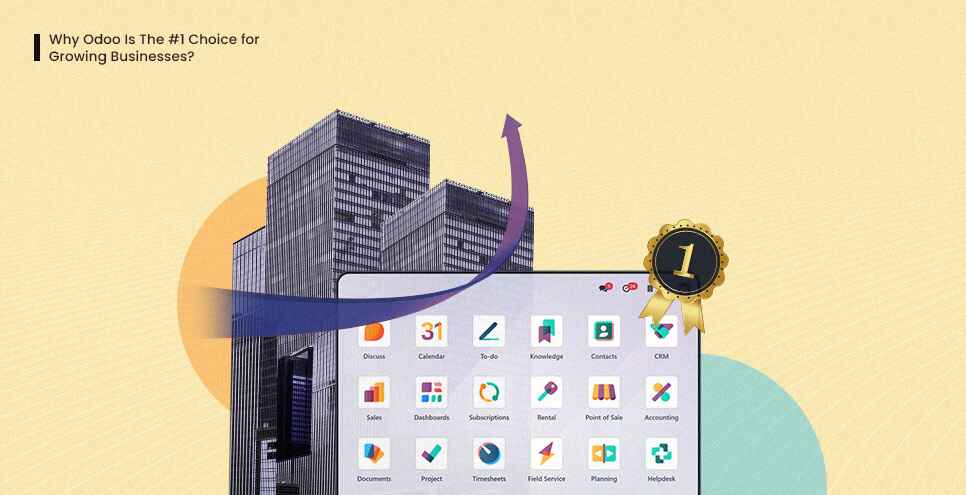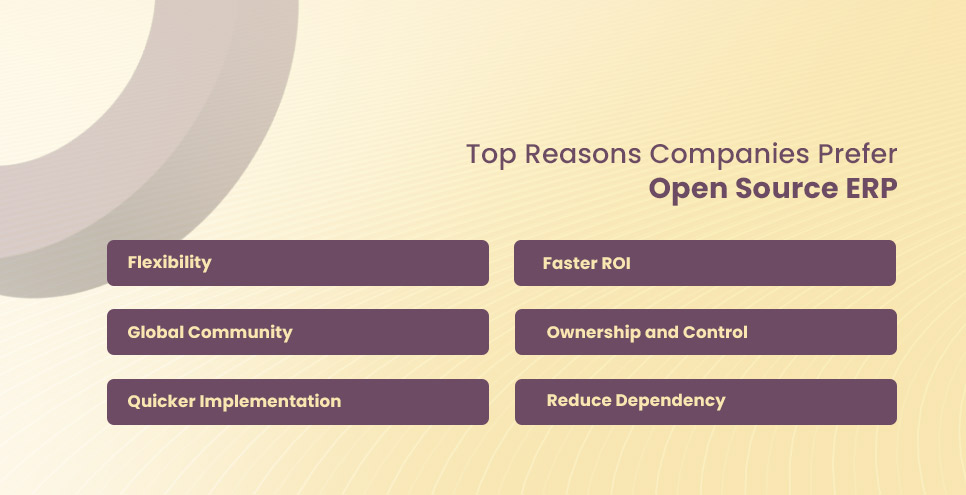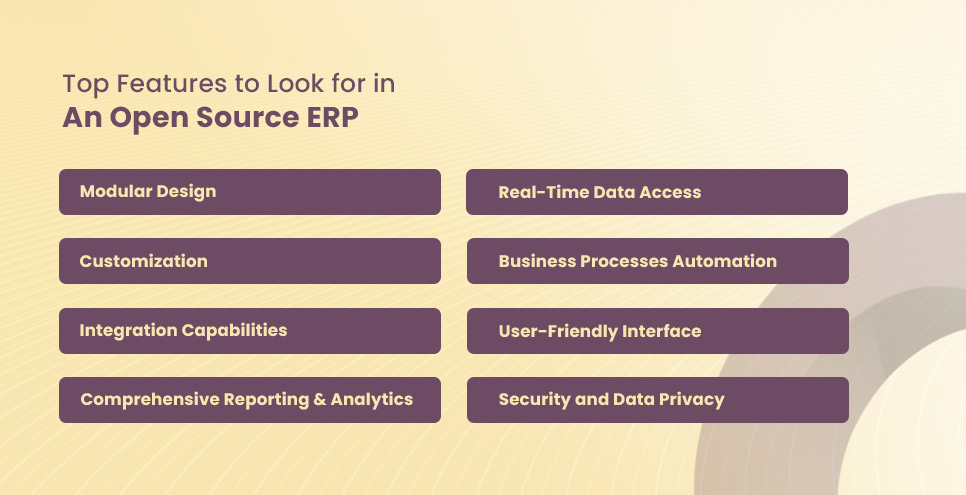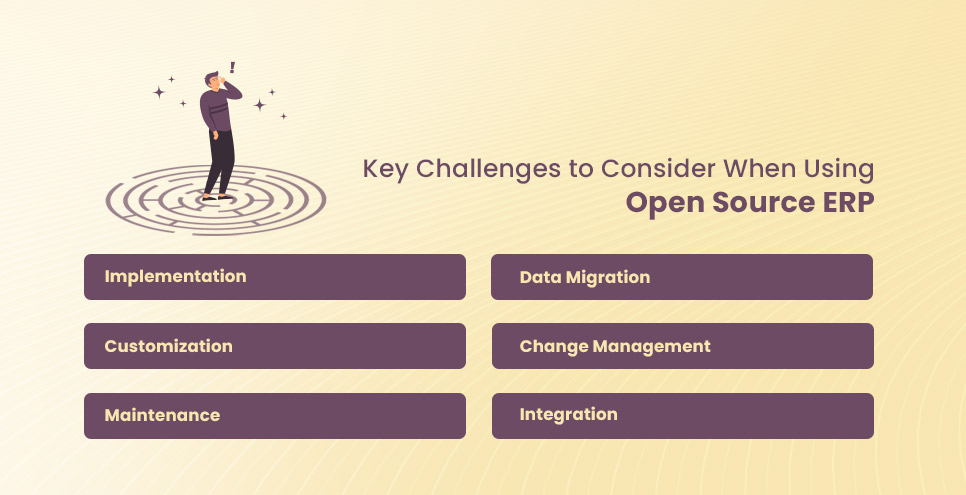
Managing HR, sales, and inventory across ten different apps? That’s not multitasking. It’s chaos.
Nothing gets done right when everything’s scattered—spreadsheets here, emails there. Before they discovered ERP, countless small and mid-sized businesses endured this daily grind. But here’s where things get interesting: what if you could manage all your business processes under one roof, without paying massive license fees? That’s the power of open-source ERP. So, what is open-source ERP really about? It’s a smarter, more flexible way to run your business. When choosing the right platform, all roads lead to Odoo.
This guide walks you through everything you need to know about open-source ERP: what it is, why it matters, how it works, and how platforms like Odoo are reshaping the future for growing businesses.
At its core, ERP (Enterprise Resource Planning) is like the brain of your business operations. It connects different departments such as HR, CRM, finance, inventory, and more into one centralized system. No more manual work, duplicate data, or unorganized transitions between various tools.
ERP ensures everyone in your business is in sync, efficient, and productive.
Open Source ERP is enterprise resource planning software whose source code is freely accessible, allowing businesses to use, modify, and distribute it without licensing restrictions.
Unlike proprietary ERP systems that lock you into fixed features and costly upgrades, open-source ERP gives you full control. You can customize modules, build new features, and fix issues without relying on the original vendor.
In short, open-source ERP gives you full ownership of your software, not just temporary access. It’s a flexible, cost-effective solution for everyone from growing startups to large enterprises that value control, scalability, and long-term freedom.
It is redefining how modern businesses operate. Companies all over the world choose flexible and affordable ERP systems to improve their speed and efficiency. Business owners can customize, integrate, and scale open-source ERP software much more easily than proprietary software. It requires minimal upfront investment. There’s no vendor lock-in. Your team stays agile, adapts quickly, and builds with the future in mind.

1. Flexibility to Adapt Quickly: Open-source ERP gives businesses the freedom to adapt quickly to changing needs. Companies can add new features, adjust workflows, or integrate with new tools with this customizable system.
2. Innovation from a Global Community: A major benefit of open-source ERP is the strong and active community that supports and improves it. Developers and users around the world are constantly improving the system, creating new features, and finding solutions to common problems.
3. Quicker Implementation and Faster ROI: With customizable ERP software, make deployment smooth and quick. This allows companies to start using the software right away, leading to faster returns on investment and a quicker path to efficiency.
4. Better Control Over Data Privacy: With the best open-source ERP, your company data stays in your hands. Unlike proprietary systems, where vendors dictate storage and access, open-source ERP lets you choose where to store your data, on your servers or in the cloud. You get complete ownership and control over your data.
5. Reduce Dependence on IT Teams: Proprietary ERP systems often require companies to depend on external IT resources for support, updates, and customizations. With open-source ERP, businesses can rely more on their internal teams or the community for help. This reduces the need for expensive vendor support, lowering long-term costs and giving businesses more control over their systems.
Open-source ERP systems have several core features that allow businesses to manage and streamline their operations efficiently. These features are designed to integrate various business functions into one unified system, providing a comprehensive solution for businesses of all sizes. Below are some of the key features that are commonly found in its systems, such as Odoo, ERPNext, and Dolibarr.

1. Modular Design: One of the standout features of open-source ERP systems is their modular structure. This design allows businesses to start with the core modules they need and expand as they grow. You can add additional modules later for accounting, HR, project management, and more, ensuring that the system scales with your business.
2. Customization: One of the biggest advantages of open-source ERP is the freedom to tailor it. So, what is open-source ERP in practical terms? It’s having access to the source code and the power to shape it around your unique workflows.
Whether you need to adjust features, add fields, or connect with external tools, this flexibility gives businesses an edge that proprietary systems simply can’t match.
3. Integration Capabilities: An open-source ERP system can seamlessly integrate with other business tools and applications. Whether you need to connect to e-commerce platforms, CRM systems, or accounting software, integration features help ensure a smooth flow of data between systems. This feature is important to maintain consistent and accurate information across your business operations.
4. Real-Time Data Access: Open-source ERP solutions provide instant access to real-time data, empowering businesses to make faster, smarter decisions.
With live insights from departments like inventory, finance, HR, and sales, companies can track key performance indicators (KPIs) and respond proactively to changes.
5. Automating Business Processes: These systems enable businesses to automate repetitive tasks and processes. For example, invoicing, payroll, and inventory management can be automated, saving time and reducing the potential for human error. Automation allows employees to focus on higher-value tasks, improving overall efficiency.
6. User-Friendly Interface: Modern open-source ERP systems prioritize a user-friendly interface. These systems are designed to be intuitive, reducing the learning curve for employees. Whether you’re managing customer data, generating reports, or tracking inventory, the user interface is clean and easy to navigate.
7. Multi-User and Multi-Department Support: These systems allow multiple users to access the system simultaneously, enabling collaboration across departments. Whether the sales team is tracking customer orders or HR is managing employee data, the system ensures that everyone is in sync.
8. Comprehensive Reporting and Analytics: Reporting and analytics features in open-source ERP provide businesses with the ability to generate custom reports and gain valuable insights into their operations. From financial reports to sales performance and inventory levels, these systems help businesses identify trends, forecast future performance, and optimize operations.
9. Cloud or On-Premise Deployment: Open-source ERP systems offer flexibility in deployment. Businesses can choose to self-host the ERP system on their servers (on-premise) or use a cloud-based solution. The cloud option offers scalability and easier remote access, while on-premise hosting provides more control over security and data management.
10. Security and Data Privacy: Despite being open-source, many ERP systems provide robust security features to protect sensitive business data. With open-source ERP, businesses have more control over their security measures. They can implement encryption, manage user access, and audit logs to ensure that only authorized users have access to confidential information.
Several modules in open-source ERP systems handle various aspects of business management. These modules work together seamlessly to streamline business operations, making it easier to manage various departments from a central system. The beauty of open-source ERP is that you can activate only the modules you need, which helps tailor the system to your specific business requirements.
Here are the core modules commonly found in most Thats systems, like Odoo:
1. Accounting and Finance: Accounting & Finance is one of the most important parts of any business. In the ERP system, this module helps businesses manage their financial transactions and reporting efficiently. Key features include:
This module keeps your business financially organized, reduces errors, and ensures compliance, setting the stage for smoother operations and long-term growth with custom accounting software.
Thus, modules of custom accounting software keep your business finance operations smooth, compliant, and error-free for growth.
2. Inventory and Warehousing: The Inventory & Warehousing module is essential for companies that deal with physical products. This module helps businesses manage their stock levels, order fulfillment, and warehouse processes. Key features include:
By automating these processes, businesses can reduce the risk of stockouts, overstocking, and errors, improving overall operational efficiency.
3. Point of Sale (POS): For retail and hospitality businesses, an integrated Point of Sale system is vital.
Key features include:
This module can significantly streamline retail operations and make the checkout process faster and more efficient.
4. Customer Relationship Management (CRM): The CRM module is designed to help businesses manage their interactions with customers, track sales leads, and build stronger relationships. Key features include:
5. Human Resources (HR): Managing employee data and payroll becomes much easier with the HR module. This module automates administrative tasks related to human resources. Key features include:
With open-source HR solutions, businesses can optimize their workforce management and reduce the burden of manual HR tasks.
6. Project Management: The Project Management module allows businesses to organize, track, and collaborate on projects more efficiently. Key features include:
This module is especially beneficial for service-based businesses that rely on managing client projects from start to finish.
7. Marketing Automation: While CRM handles customer interaction, the marketing automation module focuses more on lead nurturing, campaign management, and analytics.
Key features:
For businesses looking to integrate their marketing efforts with their sales and CRM systems, this module is incredibly helpful.
8. Helpdesk & Support: This module is useful for businesses offering post-sales support or handling customer service requests.
Key features:
If your target audience includes businesses with a significant customer service component, this module can enhance customer satisfaction and retention.
9. E-Commerce Integration: For businesses with an online store, the E-Commerce Integration module is crucial. It connects the ERP system with your e-commerce platform for seamless data synchronization. Key features include:
This module is ideal for businesses that sell online and want to streamline their back-office operations with their e-commerce activities.
10. Reporting and Business Intelligence (BI): The Reporting & BI module helps businesses make informed decisions by providing real-time data analytics and visualizations. Key features include:
With business intelligence tools, open-source ERP systems give you the insights you need to optimize operations, improve decision-making, and stay ahead of the competition.
Every business has its own unique needs, and open-source ERP gives you the freedom to customize the system to fit yours. You’re not stuck with a one-size-fits-all solution.
Need a new module for international shipments? Want to adjust how reports are generated? With open-source ERP, you can make these changes according to requirements.
With open-source ERP, there are no expensive licensing fees. You just pay for what you need, like implementation, hosting, or customization. Consequently, this shift has leveled the playing field; even smaller businesses can now afford tools that were once exclusively available to large corporations..
You’re not stuck with one company’s roadmap. With an open-source ERP like Odoo, you have the freedom to build what your business needs.
Don’t have an in-house developer? No problem, certified Odoo partners or freelance experts can help you build exactly what you need.
One of the biggest advantages of using an open-source ERP like Odoo is its thriving global community. You get regular updates, a wide range of plugins, and troubleshooting from developers worldwide.
Choosing the right open-source ERP system is a strategic move for any business aiming to streamline operations, improve efficiency, and scale effectively.
Still wondering, “What is open source ERP?” At its core, it’s an ERP solution with publicly accessible source code, which means businesses can modify and customize it to meet their exact needs. Unlike traditional proprietary systems, open-source ERP platforms provide unmatched flexibility and cost-efficiency, making them perfect for growing enterprises.
Now that we’ve covered the basics, let’s dive into how to choose the right system for your business:
Start by mapping your core business processes. Why do you need the ERP? Is it for managing inventory, finance, HR, CRM, or any combination of these functions? Understanding your workflows and operational gaps will guide your evaluation.
Knowing what open-source ERP systems can deliver in terms of modularity and flexibility is essential to making the right call.
Open-source ERP systems excel in customization. Solutions like Odoo allow you to adapt modules, build custom features, and extend functionalities without being bound by vendor restrictions.
However, this freedom also brings the necessity for skilled technical resources. Therefore, if deep customization is required, make sure the platform supports it, and just as importantly, that you have the right team or partner in place to carry it out.
A future-ready ERP should evolve with your business. The right open-source ERP system lets you add new capabilities as your company grows. Modular platforms like Odoo make it easy to start small and expand organically, supporting everything from a lean startup to a big enterprise.
What’s the point of an open-source ERP if it can not integrate with your existing tools? Whether it’s e-commerce platforms, CRMs, or financial software, your ERP should work seamlessly across all departments. Look for systems with strong APIs and pre-built connectors to ensure smooth integration.
While the base software may be free, implementation, customization, and maintenance aren’t. Factor in the cost of developers, consultants, training, infrastructure, and future upgrades. A clear understanding of your TCO (Total Cost of Ownership) helps you budget effectively and avoid unexpected costs.
A strong community of developers and users is a plus point. Platforms like Odoo benefit from vibrant communities that share knowledge, offer plugins, and solve common issues.
Still, community support may not always be fast or sufficient, especially during critical moments. This is where official partners like Kolpolok, an Odoo implementation expert, can deliver timely, professional support and peace of mind.
With open access to the source code comes the responsibility of securing and maintaining your system. Regular updates and proactive patching are non-negotiable. Choose a system with a solid track record of updates and establish a reliable update strategy to protect sensitive business data.
Open-source ERP offers flexibility and cost-effectiveness, but it’s not without its challenges. Here’s a look at what you might face and how to deal with it.

Open-source ERP often needs technical expertise to set up properly. It’s not a straightforward process. For businesses without an IT team, this can be overwhelming.
To handle this, start with clear planning. Gather requirements from all departments, use expert configuration, and roll out the system in stages. Such an approach makes the process more manageable.
Customizing open-source ERP is one of its greatest strengths. But it’s also a challenge. It requires skilled developers who understand both the software and your business.
Approach customizations like product development, modular, test-driven, and aligned with your long-term goals. Testing before full deployment helps avoid future problems.
Open-source ERP systems evolve quickly. There are frequent updates, bug fixes, and security patches.
You’ll need a maintenance plan. Schedule regular updates, conduct testing, and set up backup routines to keep the system secure and running smoothly.
Migrating data from old systems can be tricky. If done wrong, it can lead to data loss or inconsistency.
To minimize risks, create a migration plan. Conduct trial runs and validate data before fully transferring it. Involve users in testing to ensure accuracy.
ERP success depends on user adoption. If your team resists change or lacks training, the system won’t be used to its full potential.
Make sure you communicate the benefits. Focus on an easy-to-use interface. Offer practical training and continuous support to ensure users can easily adapt.
Open-source ERP systems can integrate with other tools like CRM and e-commerce, but integration requires careful planning.
To avoid issues, map out integration workflows early on. Make sure the ERP system aligns with your existing tools and select modules that fit smoothly into your setup.
| Feature | Open Source ERP | Proprietary ERP |
| Cost | Often free or competitively priced (no licensing fees) | Expensive licenses and maintenance |
| Customization | High flexibility (customizable to needs) | Limited customization and flexibility |
| Ownership | Full control over the system | Vendor-controlled system |
| Support | Community-driven, optional paid support | Dedicated vendor support |
| Updates | Regular community-driven updates | Vendor-controlled updates |
| Scalability | Easily scalable, depending on needs | Scalable but may be limited by cost |
| Security | Relies on internal security practices | Managed security by the vendor |
| Integration | Easily integrates with other systems | Limited integration options |
Among all the open-source ERP platforms, one name consistently stands out: Odoo. It’s not just software; it’s an entire ecosystem built to serve businesses of every size.
Odoo alone has over 7 million users worldwide, making it the most adopted open-source ERP platform. From small startups to large enterprises, Odoo’s modular design, rich feature set, and vibrant community make it the preferred choice for flexible and scalable ERP implementation.
Unlike most systems that force you to adapt to their structure, Odoo adapts to you. Start with the basics like CRM or accounting, then add more modules as your business grows, inventory, HR, project management, eCommerce, you name it. Everything works together out of the box.
What makes Odoo even more compelling is the balance between open-source freedom and enterprise-grade reliability. You get the transparency and control of open-source ERP, backed by paid support if you choose the enterprise edition.
Plus, you can access over 30,000 modules through the Odoo App Store. You can easily add new features without building everything from scratch.
Kolpolok, the top ERP service provider in Bangladesh and an official Odoo partner, ensures smooth Odoo deployment. From planning to customization and training, Kolpolok makes sure your ERP system runs efficiently from day one.
If you’re exploring options for your business, Odoo is more than just a tool. It’s a long-term partner in growth.
If you’ve ever asked yourself, “What is open source ERP, and is it a good fit for us? Open-source ERP isn’t for everyone, yet for many businesses, it’s the smartest move they can make. If you’re tired of juggling spreadsheets, disconnected software, and expensive license renewals, then it may be time to explore what open-source ERP can offer.
It’s a strong fit for:
But it might not be ideal if:
Still unsure? Ask yourself:
If the answer is yes, then open-source ERP, especially Odoo, could be the perfect fit.
Moreover, with implementation support from certified experts like Kolpolok, you won’t have to figure it out alone. You’ll get expert guidance at every step, from setup to support, ensuring your ERP works for you, not the other way around.
So, what is open source ERP at its core? It allows you to build, scale, and cost-effectively operate your business. No more being locked into overpriced, rigid systems. With open-source ERP, you get full control, real flexibility, and a setup that grows with your business. When it comes to choosing the best ERP solution platform, Odoo stands out. It’s modular, intuitive, and supported by a vast global community, allowing you to start small and scale seamlessly as you expand.
And if the tech side feels too much, you’re not alone. As an official Odoo partner, Kolpolok ensures a smooth implementation, from planning to ongoing support, and guides you at every step.
Now is the time to simplify operations, cut unnecessary costs, and finally take control of the situation. Let Kolpolok make your Odoo ERP transition easier, smarter. So your business runs better from day one with the right strategy.